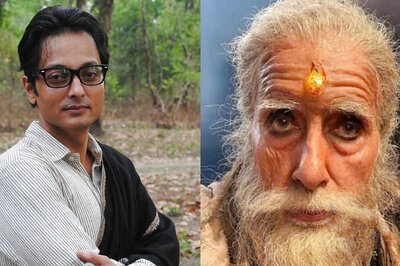
views
New Delhi: 'Gandhi to Hitler' is the movie that attempts to link two disparate leaders by letters they exchange, and by the time the final credits roll – you are still wondering what the movie was really all about.
The movie directed by Rakesh Ranjan Kumar, stars Raghubir Yadav, Neha Dhupia and Aman Verma.
The story is ideally about the last days of Adolf Hitler, which he spends hiding in a bunker in Berlin while the Allied Forces close in.
One of the most hated men in history stomps around his bunker, fumes about failed plans, commands traitors in his own Reich to be hunted down and killed, believing all along that his victory is assured. In a desperate attempt to show the other side of the coin, a shadowy, unimpressive figure of Gandhi takes innumerable walks with his silent group of followers talking about his non-violent beliefs. Things get as bad as it could with Hitler muttering in rage –"An eye for an eye!'" and is juxtaposed by Gandhi's – "An eye for an eye makes the whole world blind..."
Against the war of beliefs of these two leaders runs the story of a bunch of soldiers from Subhash Chandra Bose's Azad Hind Fauj lost in the dangerous terrain between Germany and France – trying to find their way back home. The pack is lead by Aman Verma who keeps penning letters to his wife back in India – none of which he manages to send. The soldiers squabble amongst themselves, reminisce about the fields and the food back home and in their walk back to the homeland, keep losing one brother after another and only two survive. And we are not even sure if they make it back home.
Raghubir Yadav, who is a splendid actor otherwise, completely reduces the figure of Hitler to a caricature. When furious – his speech gets garbled and his shaking frame does not do justice to the leader of the third Reich. None of his officers are believable in their roles, not even Joseph Goebbels. The only two believable characters are Eva Braun and Joseph Goebbels' wife Magda. Braun tells her new husband Hitler, after their marriage in the bunker – that she does not want to die ugly – she has just been married for a few hours. Magda on the other hand, stoically poisons her six sleeping children, finally biting in to the capsule herself and dying in her husband's arms.
The acting in most cases is not believable, the sets are bad, the footage of World War II war carnage has weird orange flames added to it. The worst and the most redundant scene is perhaps the song for Holi, filmed in Punjab, showing the contrasting beliefs of Aman Verma – the soldier and his wife Amrita – who lives by Gandhian principles. Another was a soldier kissing his girl good bye and then getting blown up a few meters away from her.
The only good scene was one of the last ones – Hitler's followers burn his body, Goebbles shoots himself in the head with his dead wife in his arms – a mirror image of Hitler and Eva Braun's last moments; Aman Verma lying dead in a picturesque valley in Switzerland with the letters to his wife strewn around him and back in India, his wife turns the lantern down for the night.
Hitler with traces of tears around his eyes when his favourite architect Albert Speers puts in his papers and chooses to leave is less believable than Aman Verma breaking down in the forests with his small band of army when he sees them fight amongst each other.
The only connection between Hitler and Gandhi are the letters. Gandhi writes him one letter opposing his cruel ways and repeating the fact that he is sure Hitler is not a bad person; which Hitler is shown to reply to. Clearly neither party makes any accommodation for the others ideas.
In the end the director chooses to show the fluttering Indian tricolour with Nehru's freedom speech playing in the background – while back in Berlin, Hitler's last few followers burn his and Eva Braun's body and then shoot themselves or bite into cyanide capsules.
And one has to wonder – sitting in an empty hall – is THIS what the director tried to show? The Third Reich and Hitler failed because they did not believe in ahimsa and committed liberal war crimes?
There has to be some more connection!



















Comments
0 comment